
Saffron Walden is a market town and civil parish in the Uttlesford district of Essex, England, 12 miles (19 km) north of Bishop's Stortford, 15 miles (24 km) south of Cambridge and 43 miles (69 km) north of London. It retains a rural appearance and some buildings of the medieval period. The population was 15,504 at the 2011 census and 16,613 in the 2021 census.
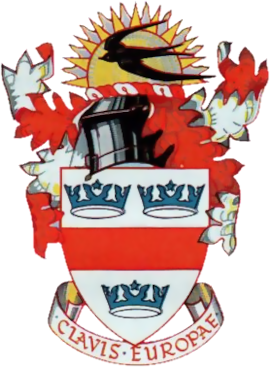
British European Airways (BEA), formally British European Airways Corporation, was a British airline which existed from 1946 until 1974.

Alan Gordon Barraclough Haselhurst, Baron Haselhurst,, is a British Conservative Party politician who served as Member of Parliament (MP) for Saffron Walden from 1977 to 2017, having previously represented Middleton and Prestwich from 1970 to February 1974. Haselhurst was Chairman of Ways and Means from 14 May 1997 to 8 June 2010, and later Chairman of the Commonwealth Parliamentary Association between 2011 and 2014. The oldest Conservative MP to stand down at the 2017 general election, he was created a life peer on 22 June 2018, sitting in the House of Lords as Baron Haselhurst.
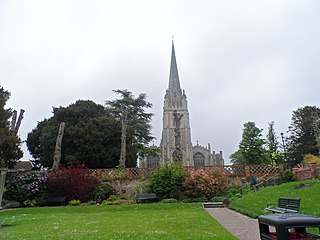
Uttlesford is a local government district in Essex, England. Its council is based in the town of Saffron Walden. The district also includes the town of Great Dunmow and numerous villages, including Stansted Mountfitchet, Takeley, Elsenham, Thaxted, and Newport. The district covers a largely rural area in the north-west of Essex. London Stansted Airport lies within the district.

Caledonian Airways was a wholly private, independent charter airline in the United Kingdom formed in April 1961. It began with a single 104-seat Douglas DC-7C leased from the Belgian flag carrier Sabena. Caledonian grew rapidly over the coming years to become the leading transatlantic "affinity group" charter operator by the end of the decade. During that period, passenger numbers grew from just 8,000 in 1961 to 800,000 in 1970. The latter represented 22.7% of all British non-scheduled passengers. It also became Britain's most consistently profitable and financially most secure independent airline of its era, never failing to make a profit in all its ten years of existence. By the end of 1970, Caledonian operated an all-jet fleet consisting of eleven aircraft and provided employment for over 1,000 workers. At that time, its principal activities included group charters between North America, Europe and the Far East using Boeing 707s, and general charter and inclusive tour (IT) activities in Europe utilising One-Elevens.
British Airtours was a charter airline in the United Kingdom with flight operations out of London Gatwick and Manchester Airports.

Matthew Evans, Baron Evans of Temple Guiting,, was a British Labour Party politician. Evans' father was the writer George Ewart Evans.
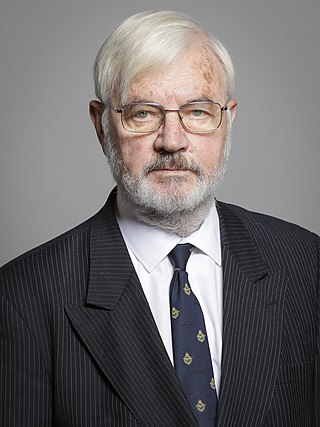
Denis Tunnicliffe, Baron Tunnicliffe,, is a British pilot and railwayman. He is a Labour Life Peer, who has had several roles in the House of Lords ranging from a Government Whip to a Defence Spokesman. He recently spent years as the Opposition Deputy Chief Whip; when Labour returned to power after the 2024 United Kingdom general election the incoming Starmer ministry allotted the deputy chief whip's position to Margaret Wheeler, Baroness Wheeler.

The Saffron Building Society is a regional building society which has branches and agencies in the East of England, spanning Essex, Hertfordshire and Suffolk. It is a member of the Building Societies Association.

Sir Maurice Flanagan was a British businessman, the founding CEO of Emirates and executive vice-chairman of The Emirates Group.
Saffron Walden Free Grammar School was a school in the Essex town of Saffron Walden, which for over four hundred years educated the boys of the town and surrounding villages in a manner designed to be after the model of Eton College and Winchester. It was notable for its longevity and for some of its illustrious alumni.
Sir Archibald Russell, CBE, FRS was a British aerospace engineer who worked most of his career at the Bristol Aeroplane Company, before becoming managing director of the Filton Division when Bristol merged into British Aircraft Corporation in 1960. He also served as the vice-chairman of the BAC-Sud Aviation Concorde Committee that produced the Concorde, working alongside Morien Morgan. His designs include the Blenheim, Britannia, Type 188 and many others. He was known throughout his career as a perfectionist, as well as his criticism for those who did not measure up – criticisms that included ministers, civil servants, the Brabazon Committee and BOAC.

British Airways (BA), the United Kingdom's national airline, was formed in 1974 with the merger of the two largest UK airlines, British Overseas Airways Corporation (BOAC) and British European Airways (BEA), and including also two smaller regional airlines, Cambrian Airways and Northeast Airlines. The merger was the completion of a consolidation process started in 1971 with the establishment of the British Airways Board, a body created by the British government to control the operations and finances of BOAC and BEA, which initially continued to exist as separate entities.
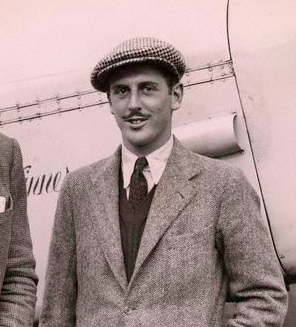
Sir Giles Connop McEachern Guthrie, 2nd Baronet, was an English aviator, merchant banker and later, an airline industry executive, serving as the chairman and chief executive of the state owned airline British Overseas Airways Corporation (BOAC).

British Overseas Airways Corporation (BOAC) was the British state-owned airline created in 1939 by the merger of Imperial Airways and British Airways Ltd. It continued operating overseas services throughout World War II. After the passing of the Civil Aviation Act 1946, European and South American services passed to two further state-owned airlines, British European Airways (BEA) and British South American Airways (BSAA). BOAC absorbed BSAA in 1949, but BEA continued to operate British domestic and European routes for the next quarter century. The Civil Aviation Act 1971 merged BOAC and BEA, effective 31 March 1974, forming today's British Airways.
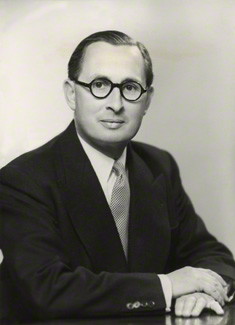
Sir Basil Smallpeice, was an English accountant and businessman, who served as a director of several companies, including the state-owned airline British Overseas Airways Corporation (BOAC), the shipping company Cunard and the mining-based conglomerate Lonrho.
Sir John Ross Stainton CBE was a British businessman, and a former chief executive of British Airways and BOAC in the 1970s.
Sir Peter Masefield was a leading figure in Britain's post war aviation industry, as Chief Executive of British European Airways in the 1950s, and chairman of the British Airports Authority in the 1960s.
Hugh Palliser Kingsley Dibley is a former commercial airline pilot and trainer who made contributions toward conserving fuel and controlling noise during aircraft operations. He was also a successful racing car driver and race car constructor.












